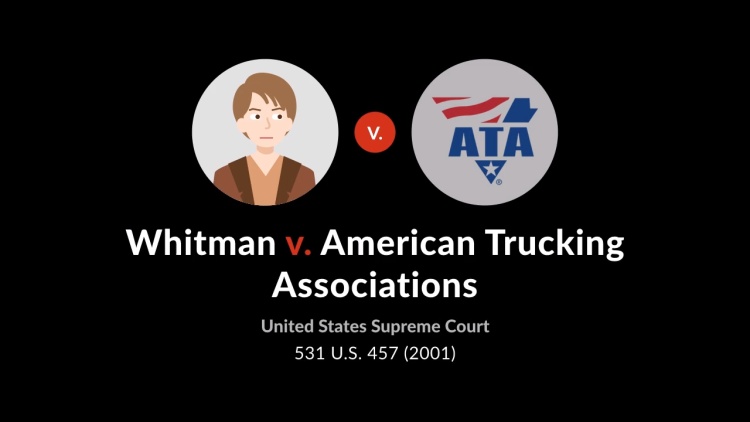Whitman v. American Trucking Associations, Inc.
United States Supreme Court
531 U.S. 457 (2001)
- Written by Susie Cowen, JD
Facts
Section 109(a) of the Clean Air Act (CAA) required the administrator of the Environmental Protection Agency (EPA) (defendant) to promulgate national ambient-air-quality standards (NAAQS) for certain air pollutants. Section 109(b)(1) of the CAA directed the EPA to set ambient-air-quality standards, the attainment and maintenance of which in the judgment of the administrator were necessary to protect the public health. In July 1997, the EPA administrator revised the NAAQS for particulate matter and ozone. The American Trucking Associations, Inc., and others (plaintiffs) challenged the new standard in federal court. The United States Court of Appeals for the District of Columbia Circuit found that § 109(b)(1) of the CAA delegated legislative power to the administrator in contravention of Article I, § 1 of the United States Constitution because the EPA had interpreted the CAA to provide no “intelligible principle” to guide the agency’s exercise of authority. The appellate court further held that the administrator was prohibited from considering the costs of implementation in setting NAAQS under the CAA. The appellate court remanded the NAAQS to the EPA. The case then came before the United States Supreme Court.
Rule of Law
Issue
Holding and Reasoning (Scalia, J.)
Concurrence (Stevens, J.)
Concurrence (Breyer, J.)
Concurrence (Thomas, J.)
What to do next…
Here's why 911,000 law students have relied on our case briefs:
- Written by law professors and practitioners, not other law students. 47,100 briefs, keyed to 997 casebooks. Top-notch customer support.
- The right amount of information, includes the facts, issues, rule of law, holding and reasoning, and any concurrences and dissents.
- Access in your classes, works on your mobile and tablet. Massive library of related video lessons and high quality multiple-choice questions.
- Easy to use, uniform format for every case brief. Written in plain English, not in legalese. Our briefs summarize and simplify; they don’t just repeat the court’s language.





